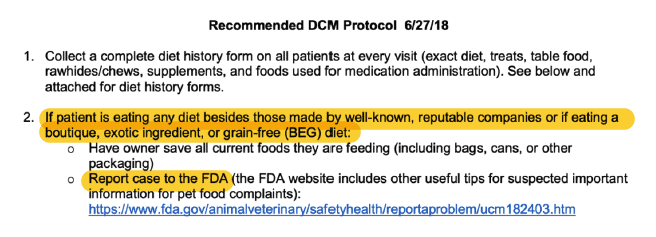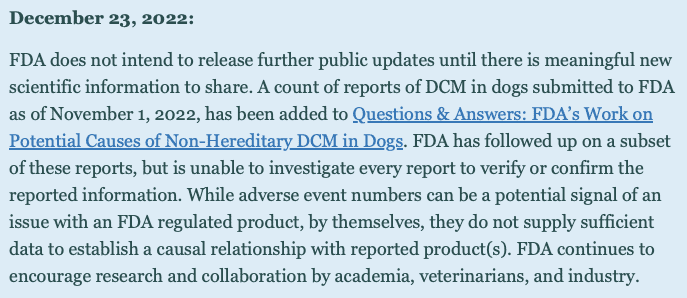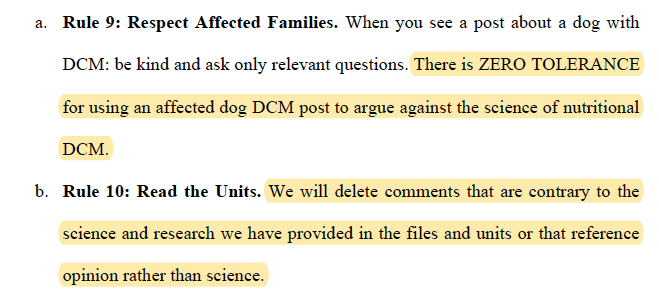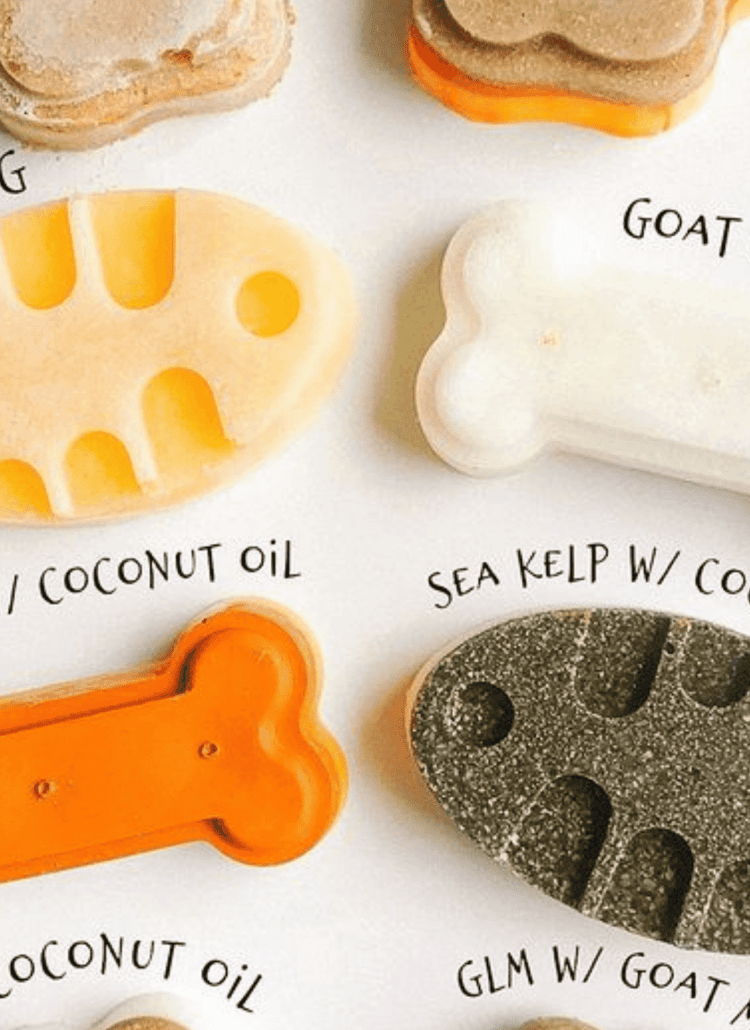I’m ashamed to admit that I was one of those pet parents that fell for the misinformation being spread about the relationship between DCM and grain-free diets. I believed there was data supporting these claims and I blamed myself for the death of our boxer, Max. You see, I had been feeding Max a grain free kibble for years before he passed and when the internet exploded with articles from highly regarded veterinarians claiming a relationship between grain free foods and DCM, I trusted them and felt shame and guilt. You can find my post about DCM here.

On February 5, 2024, KetonNatural filed a civil suit in the District Court of Kansas against Hill’s Pet Nutrition, Inc., Morris Animal Foundation, Mark Morris Institute, and veterinarians Lisa M. Freeman, Darcy D. Adin, Joshua Stern, Ryan Fries, and John Rush accusing them of carrying out a scheme “to falsely convince American dog owners that a massive, unrelated, and hugely diverse group of dog food products . . . all increase the risk and severity of deadly canine heart disease called dilated cardiomyopathy (“DCM”).”
When I first read this 124-page complaint, I simultaneously felt anger and disappointment but before I share my feelings about this, let me quickly summarize the claims here for you.
Please note this is a summary and as such I did not include every piece of information shared in the complaint. I highly recommend you read the entire complaint, which can be found here. Yes, it’s long, but the details and the information shared is eye-opening.
HOW IT STARTED
KetoNaturals claims that “In or around 2017, Hill’s was facing flat sales, rapid erosion of its market share, and a new, concentrated competitive threat that uniquely disadvantaged it and not its large peers. Against this backdrop,, on information and belief, Hill’s, Dr. Freeman, Dr. Adin, and the other Defendants devised a plan. They decided that they would conduct a coordinated campaign to raise “concerns” about the “risks” of grain-free pet foods.
Using the tools of professional science and Hill’s vast veterinary influence network, the goal of the scheme was to persuade American pet-owners that grain-free diets weren’t just “fad diets” but actually dangerous for dogs—an argument that, if successful, had the potential to eradicate the entire grain-free sector of the pet food market.”
The scheme was designed to:
- Publish articles, and
- Cherry-pick information to be sent to the FDA
The plaintiff in this case, KetoNatural Pet Foods, Inc., obtained internal emails and electronic information through the Freedom of Information Act (FOIA). While reviewing the production, the plaintiff uncovered emails from some of the defendants to an FDA Veterinary Medical Officer requesting a meeting to discuss their “clinical observations and concerns concerning a potential relationship between grain-free canine diets and Dilated Cardiomyopathy.”
Now you may say to yourself, what is wrong with that? If they were encountering this correlation in their practice, wouldn’t it be a good idea to report it to the FDA? Well, yes, but shouldn’t all cases have been reported?
Here is what we are learning about their in-house protocol for reporting cases to the FDA. This is a clip from an email obtained from the FOIA request:

The complaint goes on to explain that on the date that the FDA announced their DCM investigation, July 12, 2018, the FDA had received 24 reports of canine DCM year-to-date and 28 reports since 2014. Significantly, 23 of the 28 canine cases in this report came from two of the defendants in this case. By 2019, these two defendants had submitted at least 140 canine DCM case reports to the FDA.
What is interesting to note here is that during this time, Dr. Adin, a co-defendant in this lawsuit, was conducting her own study involving 49 dogs. “Of these, 22 were diagnosed with DCM while being fed grain-free diets while 27 (the majority of the dogs in her data set) developed DCM while being fed so-called “traditional” diets.” Yet these were NOT submitted to the FDA.
KetoNaturals claims that it was Dr. Freeman’s and Dr. Adin’s biased reporting that led the FDA to “focus its wording on diets with legumes, peas, lentils, potatoes and those that are grain free.”
THE FDA ANNOUNCED AN INVESTIGATION
The FDA announced their investigation on July 12, 2018, and rightly so, however there was never any finding of a relationship between grain-free diets and DCM.
Here is the FDA issued press release on December 23, 2022:

Nevertheless, according to KetoNaturals the defendants authored “study after study about DCM and then characterized the findings” in articles published. Many of these were published by the Journal of the American Veterinary Medical Association (“JAVMA”), the most widely read veterinary science journal in the world.
Starting as early as July 24, 2018, 12 days after the FDA announces their investigation, the defendants published articles implying a relationship. Below is a non-exhaustive collection of articles listed in the complaint.
- Jan Hoffman, Popular Grain-Free Dog Foods May Be Linked to Heart Disease, New York Times. July 24, 2018.
- Kate Furby, Grain-Free, Exotic Dog Food Linked to Heart Disease, Washington Post. Aug. 29, 2018.
- Linda Carroll, It’s Not Going Away: Vets Still Seeing Cases of Dogs Heart Problems Linked to Grain-Free Food, NBC News, Dec. 27, 2019.
- Linda Carroll, New ‘Piece of the Puzzle’: Why Some Dog Foods May Be Linked to Deadly Heart Disease, NBC News, Aug. 5, 2021.
“Defendants promoted that investigation as if it proved the existence of the phenomenon it proposed to investigate. Defendants told the public that grain-free diets actually were overrepresented among cases of canine DCM.”
These are just a subset of the articles published and listed in KetoNaturals Complaint, but one article in particular hits home to me:
- Lisa M. Freeman, Diet-Associated Dilated Cardiomyopathy: The Cause Is Not Yet Known But It Hasn’t Gone Away, Feb. 7, 2023.
In this article Dr. Freeman writes:
Diet-associated DCM has been devastating both for the affected dogs and their owners. Veterinarians working closely with these patients have been impacted by the distress the diagnosis has caused owners because of the severity of the disease, cost of treatment, and sadness when a beloved dog is sick or dies. But, in addition, most owners I’ve worked with thought they were feeding their dogs the best food possible, only to find out that the diet may have contributed to their dogs’ heart disease.
The article was published on February 7, 2023, two months after the FDA released their statement announcing that they do not have sufficient data to establish a causal relationship.
According to KetoNaturals, the propaganda campaign was amplified by the defendants “citing and repeating those assertions in Defendants’ subsequent academic writings . . .through the use of Defendant Hill’s wesite . . . and through veterinary and techinician continuing education programs created, sponsored, or promoted by the Defendants.
THE FACEBOOK GROUP
The complaint highlights a Facebook group that seems most central to Defendants’ scheme. The group is currently called “Diet-Associated Dilated Cardiomyopathy (DCM) in Dogs” and has more than 129,000 members.
“The DCM Facebook Group currently disguises its origins and lists 23 different moderators. But correspondence with the FDA obtained through FOIA shows that prior to 2018, the group was “working closely with” Defendant Stern, and his publications are featured prominently in the literature the group promotes. The DCM Facebook Group is not a forum open to discussing the science; rather, its rules expressly mandate a single point of view:

The complaint explains how the handouts and information available for download from the group consistently mischaracterizes the information available.
Rebuilding Trust: Seeking Transparency and Honesty in Pet Food
So now I ask you, how do we build trust from here? We pet parents deserve transparency and honesty from the brands we rely on to nourish our beloved pets and the doctors we entrust with their lives. This lawsuit served as a wake-up call, reminding us of the need to scrutinize article claims and pay attention to the person making those claims and question why. If they cite scientific studies, read them, because unfortunately we have learned we can’t take them at their word.
With all of this said, I urge you to follow this lawsuit closely and to be open-minded. We shall hear soon what the defendants have to say when they file their Answer. Let’s follow the evidence to wherever it may lead us and come to our own conclusions.
As a dog mom, I am committed to advocating for greater accountability within the industry and supporting brands that prioritize transparency and ethical practices. While this lawsuit was undoubtedly unsettling, it definitely sparking important conversations about the standards we expect from pet food companies and veterinarians alike.




